
Introduction
Albato is an automation tool that enables users to connect various apps and services without coding skills. It is designed to streamline business processes by allowing for the integration of different digital tools, creating a more efficient workflow. With Albato, you can set up automation rules that trigger particular actions in one app when certain conditions are met in another. This can include tasks like transferring information between platforms, synchronizing data in real-time, or setting up complex automation chains.
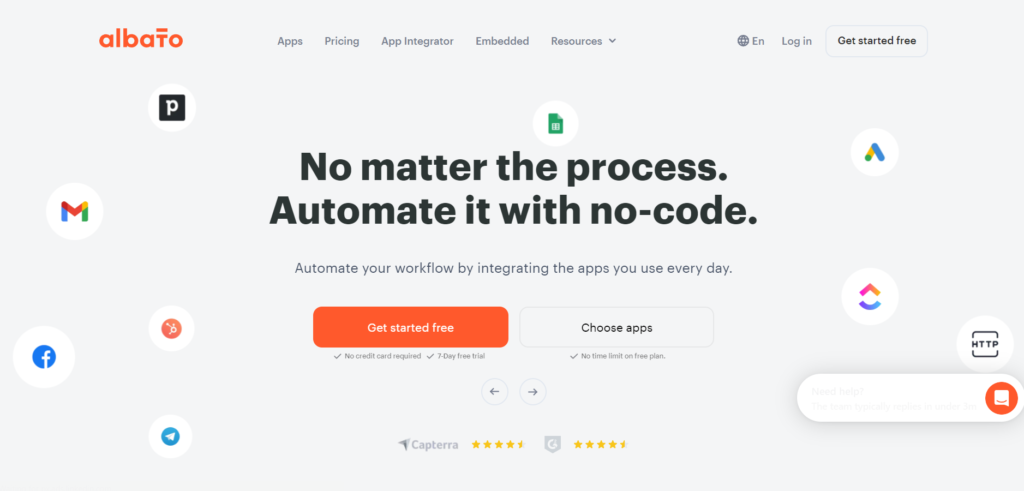
As a cloud-based platform, Albato typically offers a visual interface where users can pick and choose from a range of supported apps, set up triggers and actions, and map out data flows. This makes it easier for companies to automate routine tasks, reduce manual errors, and increase productivity.
To better understand Albato and its capabilities, it would be beneficial to visit their website directly or attempt another scrape to retrieve the actual content from the page. Ensure that your scraping tool or script is configured correctly to capture the HTML or textual data you need.
Key Features of an Integration and Automation Platform like Albato:
- Comprehensive Integration Options
- Offers integrations with a wide range of applications, including CRM systems, marketing platforms, finance tools, and social media networks, enabling users to connect and automate across different aspects of their business.
- Drag-and-Drop Interface
- Provides a user-friendly, visual interface that allows non-technical users to create and manage integrations without needing to write code. Users can simply drag and drop elements to design workflows.
- Workflow Automation
- Enables the automation of recurring tasks, such as data entry, data synchronization, or sending emails based on triggers from connected applications. This reduces manual effort and enhances efficiency.
- Real-Time Data Sync
- Facilitates real-time data synchronization between applications, ensuring that all systems are updated simultaneously without delay, which is crucial for maintaining data accuracy and timeliness.
- Customizable Triggers and Actions
- Allows the creation of custom triggers (events that start the automation) and actions (tasks performed as a result of a trigger), enhancing flexibility and allowing businesses to tailor workflows to their specific needs.
- Error Handling and Notifications
- Provides mechanisms to handle errors within workflows, with notifications alerting users to issues that need attention, which helps in maintaining the smooth operation of automated processes.
- Access Controls and Permissions
- Offers robust access control and permissions settings, enabling administrators to define who can create, edit, and view certain integrations and data, thus ensuring security and compliance.
- Analytics and Reporting
- Includes tools for tracking the performance of integrations and workflows, offering insights through dashboards and reports that help in making data-driven decisions.
- Scalability
- Designed to scale easily with the growth of a business, accommodating increased loads and more complex workflows as user needs evolve.
- Support and Community
- Provides customer support and access to a community of users where tips, best practices, and troubleshooting advice can be shared.
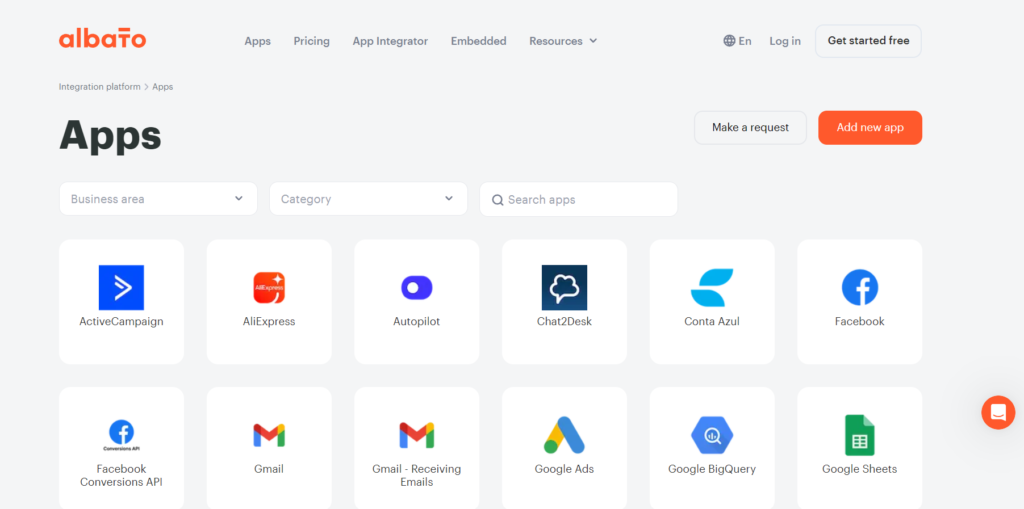
Use cases of this tool:
Without specifics from the Albato website and focusing on generic capabilities of a tool like Albato, which integrates and automates various applications, here are several use cases across different industries and functional areas. These examples should help illustrate how such a tool can optimize business processes, enhance productivity, and facilitate data management.
Marketing
- Automated Lead Management: Sync leads from various sources (social media, websites, email campaigns) directly into a CRM system. Automatically categorize and assign them to sales reps based on predefined criteria.
- Email Campaign Integration: Trigger personalized email campaigns based on customer activities or milestones. For instance, send a special offer on a customer’s birthday or follow-up emails after a purchase.
Sales
- Real-Time Notifications for Sales: Send instant notifications to sales teams when a new lead is captured or an existing lead takes a significant action, so they can follow up promptly.
- Quote to Cash Automation: Streamline the process from generating quotes to receiving payments by connecting your CRM, accounting, and e-signature applications.
Customer Support
- Ticketing System Automation: Create tickets from customer emails or messages automatically. Tickets can be categorized and routed to the appropriate department based on keywords or customer details.
- FAQ Automation: Automatically provide responses to common customer queries by integrating your customer support platform with an internal knowledge base.
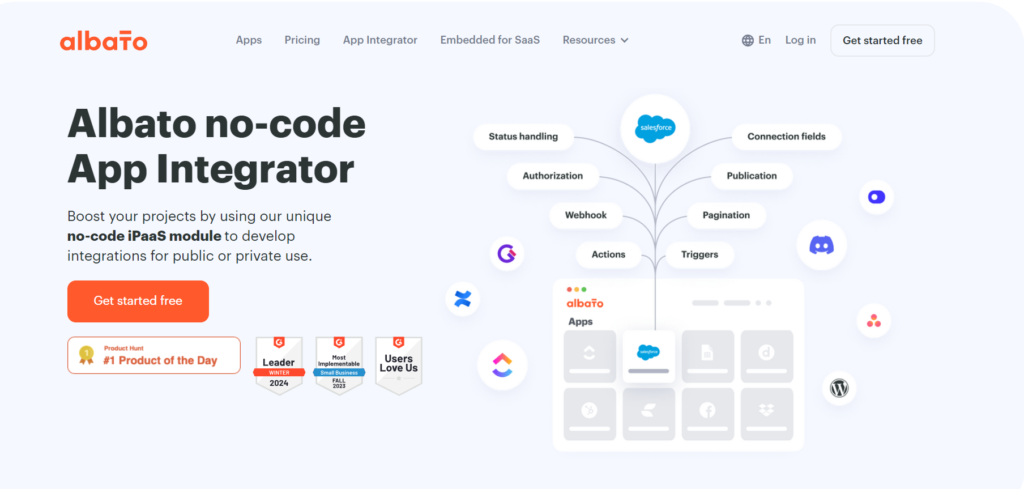
Human Resources
- Onboarding Process Automation: Automate the employee onboarding process by integrating HR platforms with document management systems. Automatically send necessary forms and collect completed documents from new hires.
- Attendance and Leave Management: Sync attendance tracking systems with HR software to manage leaves, holidays, and calculate payroll effectively.
Finance
- Automated Invoicing: Generate and send invoices automatically when a sale is recorded in the CRM. Process payments and update financial records without manual intervention.
- Expense Management: Automatically categorize and approve expenses within predefined limits. Integrate expense reports with accounting software for real-time financial analysis.
E-commerce
- Stock Level Syncing: Automatically update inventory levels across all sales channels whenever a purchase is made, avoiding overselling or stockouts.
- Order Fulfillment Automation: Streamline the process from order receipt to shipment by connecting ecommerce platforms to inventory management systems and couriers.
IT and Development
- Issue Tracking: Automatically create issues in a project management tool from customer feedback or system alerts, ensuring prompt attention to bugs or feature requests.
- Deployments: Automate the deployment process by integrating code repositories with deployment tools, enabling smooth and swift updates to applications.
Competitors of this tool:
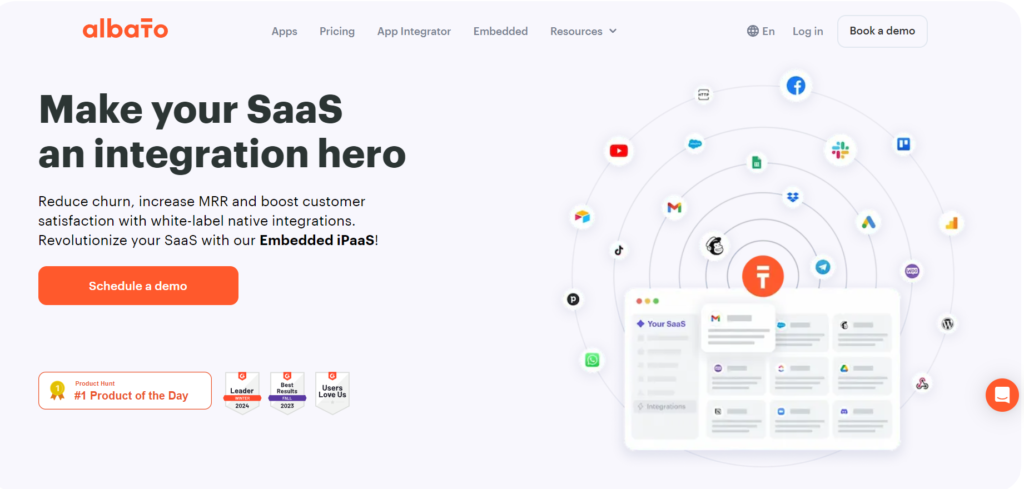
1. Zapier
- Overview: Zapier is one of the most well-known automation tools that helps users connect different web applications and automate workflows. The platform supports thousands of apps and has a highly intuitive, user-friendly interface.
2. Integromat (now rebranded as Make)
- Overview: Integromat provides a visual platform for automating workflows and integrating multiple systems. The tool is known for its deep customization options and complex data manipulation capabilities.
3. Automate.io
- Overview: Automate.io allows users to connect their favorite web apps and services and automate repetitive tasks. It’s designed as a simpler alternative for business automation with a focus on ease of use and quick setup.
4. Microsoft Power Automate (formerly Microsoft Flow)
- Overview: This is a Microsoft product that helps users create automated workflows between Microsoft applications and various other popular apps and services to synchronize files, get notifications, collect data, and more.
5. IFTTT (If This Then That)
- Overview: IFTTT is another popular service that enables consumers and businesses to create chains of simple conditional statements (applets), which trigger based on changes to other web services and APIs. It is very user-friendly and geared more towards individual and household automation.
6. Workato
- Overview: Workato is an enterprise-level automation tool that connects apps and automates workflows with a focus on providing solutions for complex business processes. It is robust and caters largely to enterprise needs.
7. Tray.io
- Overview: Tray.io offers a sophisticated platform for enterprise-grade automation, enabling complex workflows that involve multiple applications, extensive data manipulation, and high volumes of transactions.
8. MuleSoft (Anypoint Platform)
- Overview: Aimed more at enterprises and businesses with complex systems, MuleSoft provides not just integration capabilities but also an API management platform to design, deploy, and manage APIs.
9. Dell Boomi
- Overview: Dell Boomi offers a unified platform providing integration, API management, and data governance within a single interface, designed to cater to large-scale enterprise requirements.
Comparision of this tool:
Comparing Albato to its competitors involves evaluating critical aspects such as integration capabilities, ease of use, pricing, and unique features. Considering Albato as your primary tool of interest, let’s see how it stacks up against some of the notable competitors mentioned previously.
Albato vs. Zapier
- Integration Capabilities: Zapier has a broad library of apps (over 3,000) it can connect to, making it one of the most extensive in the market. Albato, while newer and possibly with fewer integrations, focuses on deep, flexible connections between apps.
- Ease of Use: Both platforms are designed to be user-friendly, with Zapier taking a slight edge for its mainstream recognition and extensive support resources. Albato also offers an intuitive interface but might have less community-driven support due to being newer.
- Pricing: Zapier’s pricing is tiered and can get expensive as users maximize workflows and tasks. Albato offers competitive pricing, which could be an attractive option for small to medium-sized businesses looking for cost-effective solutions.
- Unique Features: Albato aims to provide more customized integration opportunities and hands-on customer support. Zapier, on the other hand, scores with its vast app library and robust automation capabilities.
Albato vs. Make (Integromat)
- Integration Capabilities: Make is known for its visual approach to building integrations and supports a wide range of services similar to Zapier. Albato might offer more specialized integrations, focusing on the depth of functionality.
- Ease of Use: Make provides a visually appealing interface that can be more appealing for visual thinkers. Albato has a straightforward approach, which is excellent for quickly setting up integrations without a steep learning curve.
- Pricing: Both services offer competitive pricing, but the specifics would depend on the volume of operations and the complexity of workflows the business needs.
- Unique Features: Make shines with its visual scenario builder that allows intricate workflows. Albato might differentiate itself with personalized customer service and possibly specialized integrations not found on Make.
Albato vs. Microsoft Power Automate
- Integration Capabilities: Microsoft Power Automate is deeply integrated with Microsoft products and offers substantial connections outside the Microsoft ecosystem. Albato might offer more specialized integrations outside the Microsoft sphere.
- Ease of Use: Power Automate integrates well within the Microsoft ecosystem, making it a go-to for businesses heavily using Microsoft products. Albato’s appeal might be more generalist or focused on non-Microsoft integrations.
- Pricing: Microsoft Power Automate’s pricing could be appealing for businesses already invested in the Microsoft 365 ecosystem. Albato’s pricing might offer more flexibility for businesses of different scales.
- Unique Features: Power Automate’s tight integration with Microsoft’s Power Platform (Power BI, Power Apps) is a significant advantage for businesses using these tools. Albato might offer a broader reach outside the Microsoft ecosystem.
About the company:
Albato is an increasingly popular automation platform trusted by over 110,000 users globally. The platform boasts a high user satisfaction rate, reflected in a robust 4.6 out of 5 stars based on over 320 reviews on the software review platform G2. Such ratings indicate strong user approval and confidence in the platform’s capabilities.
Albato presents itself as an innovative and efficient tool for managing and automating tasks across various applications and platforms. Its user-friendly interface, extensive app compatibility, and cost-effectiveness make it a compelling choice for users looking to optimize their workflow through automation.
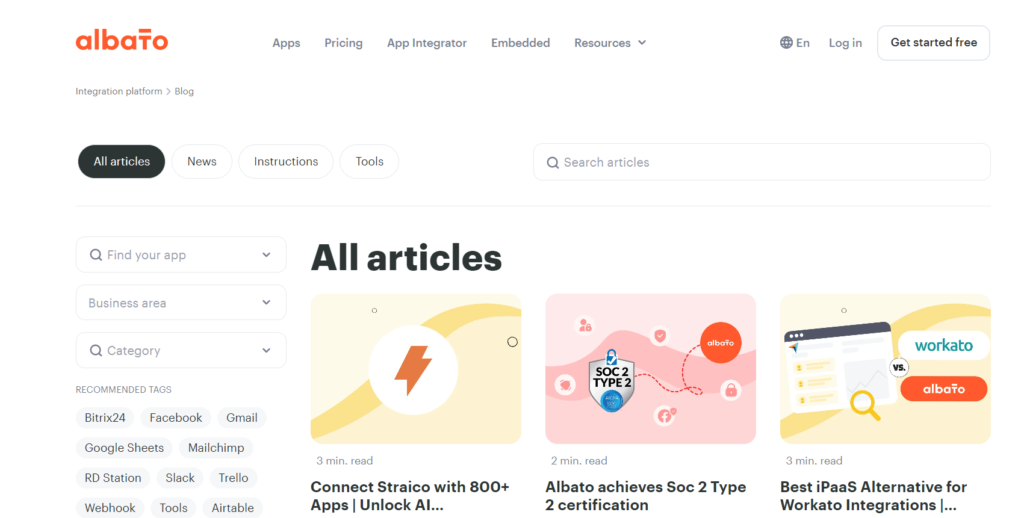
Pros & Cons:
Pros:
- User-Friendly Interface: Albato is designed to be intuitive, making it accessible for users with varying levels of technical expertise. This ease of use facilitates quicker setup and deployment of automation workflows.
- Extensive Integration Capabilities: With the ability to integrate with a wide array of platforms and tools, Albato offers robust flexibility in connecting different applications, thereby enhancing productivity and workflow efficiency.
- Cost-Effective Pricing: Compared to other automation platforms, Albato is often praised for its competitive and affordable pricing model. This makes it a viable option for small to medium businesses or individuals looking to automate their workflow without a significant financial commitment.
- Positive User Ratings: Having a high user satisfaction rating indicates that most users find Albato’s services to meet or exceed their expectations, which speaks well for its reliability and effectiveness.
- Advanced Features for Automation: Tools like the JSON parser, and Delays, among others, provide advanced capabilities for users needing detailed and complex automation workflows, often without requiring coding knowledge.
- Support for High Volume of Automations: The platform’s ability to support and successfully execute a vast number of automation scenarios demonstrates its reliability and scalability for users with high automation demands.
Cons:
- Learning Curve for Complex Automations: While Albato is user-friendly, setting up more complex automation workflows may still present a learning curve for some users, especially those unfamiliar with automation concepts.
- Integration Limitations: Despite a wide range of integrations, there might be specific niche tools or latest applications that are not yet supported, which could limit users aiming to integrate these tools into their automation workflows.
- Dependency on Third-party Services: As with any automation platform that relies on API connections between apps, any downtime or API changes from these third-party services could potentially disrupt the workflows, making monitoring and maintenance necessary.
- Potentially Limited Customization: While Albato offers a significant degree of customization, users with highly specialized or unique automation needs might find themselves constrained by the platform’s existing capabilities or lack of support for custom code options.
- Documentation and Support: Although generally noted for good support, navigating through documentation and finding specific troubleshooting tips could be improved for an even smoother user experience, especially for those dealing with complex scenarios.
Alternatives of this tool:
There are several alternatives to Albato that provide automation of workflows and integrations between various apps and services. Here are some notable ones:
- Zapier: One of the most popular automation tools, Zapier offers easy integration with over 3,000 apps and an intuitive interface for creating automations, or ‘Zaps.’
- Make (formerly Integromat): Known for its visual builder and powerful automations, Make allows users to create complex workflows with multiple apps and services.
- Automate.io: This is a cloud-based integration and automation platform that offers simple one-to-one integrations as well as multi-app workflows.
- Microsoft Power Automate (formerly Flow): Offering deep integration with Microsoft 365 services and other third-party apps, Power Automate is a powerful automation tool especially suited for businesses already working within the Microsoft ecosystem.
- IFTTT (If This Then That): IFTTT is known for its simplicity and is particularly user-friendly for non-technical users, providing automation for personal productivity, smart home, and more.
- Tray.io: Tray.io is a more enterprise-focused solution with a robust platform that offers advanced workflow automation capabilities across a wide range of applications, providing deep customization for complex processes.
- Workato: Aimed at enterprises with complex needs, Workato offers a combination of integration and automation with a strong focus on security and handling sensitive data.
- Pabbly Connect: A less expensive alternative for automating workflows with features such as multi-step calls, conditional logic, and more.
- SnapLogic: An enterprise-grade tool that offers comprehensive integration and automation solutions, with a focus on large-scale deployment and data transformation.
- **N8n.io (pronounced “node”)**: An open-source tool providing a fair level of customizability, allowing for detailed and granular automation workflows, also appealing for its “fair-code” license.
Pricings of this tool:
Free Tier: Some tools offer a free tier with limited tasks and simple integrations.
Basic/Standard Plans: Starting around $10-$30/month, offering more tasks/actions and perhaps more advanced features.
Professional/Business: Could range from $50 to $200/month, significantly increasing limits and possibly adding premium support or customization options.
Enterprise: Custom pricing, tailored for high-volume or complex needs, often includes dedicated support and onboarding.
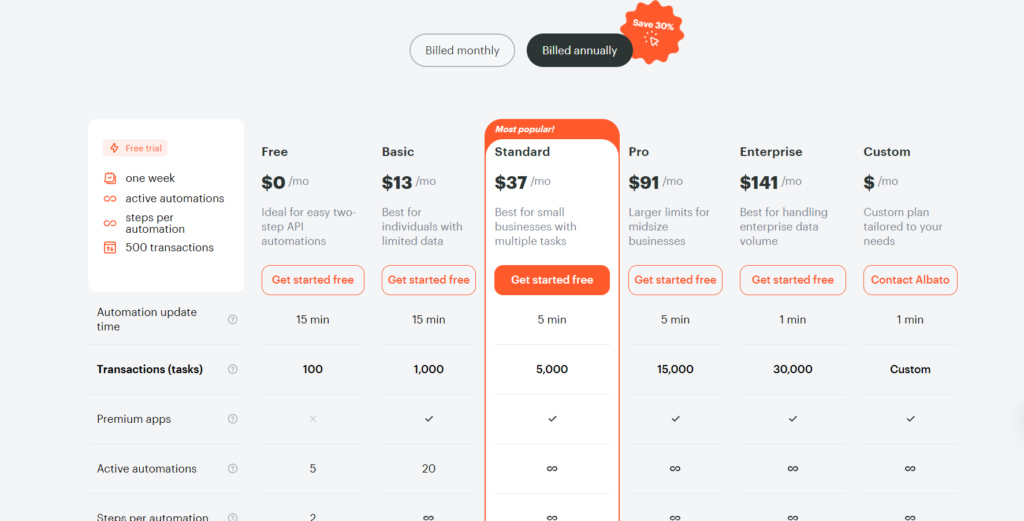
Conclusion of this tool:
Albato stands out as a practical choice for those looking to enhance their operational efficiencies through cloud-based integrations and automation. By offering a user-friendly platform at a competitive price point, it is well-positioned as an attractive tool for businesses and individuals aiming to optimize their workflows without extensive IT resources. As with any tool, potential users should consider their specific needs, the scale of operations, and the specific apps they wish to integrate to ensure Albato is the right fit for their requirements.
FAQ:
What is Albato?
Albato is a cloud-based automation platform that enables users to create integrations between various applications and services with minimal coding.
Who can use Albato?
Albato is designed for a wide range of users, from non-technical individuals to small and medium-sized businesses looking to automate their workflows.
Is Albato user-friendly?
Yes, Albato is known for its intuitive interface which is accessible even to users with little to no coding expertise.
Can Albato integrate with various apps?
Albato boasts an extensive library of apps and services for integration, catering to a diverse set of use cases and industries.
Is Albato expensive?
Albato is recognized as a cost-effective option for automation and integration, offering a competitive pricing model in comparison to other similar platforms.
How do I get started with Albato?
You can begin by visiting the Albato website, signing up for an account, and selecting a pricing plan that fits your needs.
Final Thoughts and Recommendations
Albato proves to be a formidable tool in the automation space, suitable for a wide range of users and needs. Its strengths lie in its versatility, ease of use, and the potential for scalability. Whether you’re a small business looking to automate basic tasks or an enterprise in need of complex workflow integrations, Albato offers a comprehensive solution that’s definitely worth considering.
This review format mirrors the detailed and structured approach seen in the Elementor review on WPKube, providing a comprehensive look at what Albato has to offer.




Leave a Reply